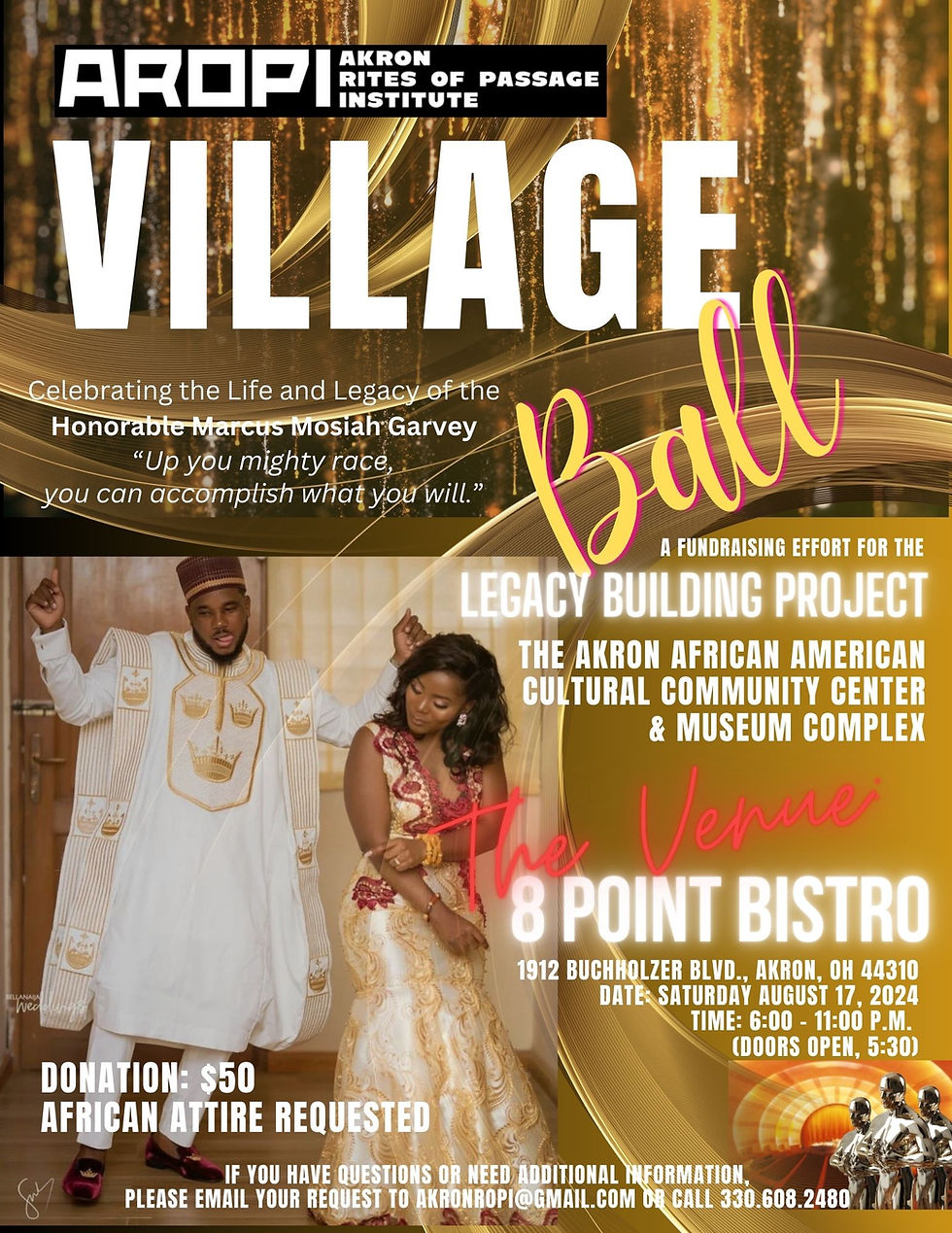AROPI Call for Nominations for The Village Ball Awards
- Editor Ellis
- May 22, 2024
- 3 min read

THE VILLAGE BALL AWARDS CRITERIA
The Akron Rites of Passage Institute is seeking nominations for awards to be presented at The Village
Ball on Saturday, August 17, 2024: namely: 1) The Marcus Mosiah Garvey Award (Trailblazer); 2) The
Sojourner Truth Award (Activist); and 3) The John Brown Award (Of our Kin) Award. A fillable nomination
form is available at Afrocentric.Info/AVB along with all other related information concerning The Village
Ball.
Nominees for awards should be an individual living in the greater Akron area who embodies many of the
character, principles and/or beliefs of the person named in the award.
Marcus Mosiah Garvey Jr. was a Jamaican political activist. He was the founder
and first President-General of the Universal Negro Improvement Association--
UNIA and African Communities League. Ideologically, a Black nationalist and Pan-
Africanist, his ideas came to be known as Garveyism. Marcus Garvey and the
UNIA form a critical link in Black America’s centuries-long struggle for freedom,
justice, and equality. Garvey’s legacy continues to instill pride and inspiration
among many African American people throughout the diaspora. Some of his
characteristics include:
Organizer
Black Cultural Economic Success
Entrepreneur
Orator
Pan Africanist
Self-reliant
Pan African mindset approach
Resilient
Philanthropist/charitable
Iconic Figure
Advocated Self-Sufficiency in Black Communities
Used his own resources to accomplish his goals
Creative, i.e. RBG flag
Sojourner Truth was an American abolitionist and activist for African-
American civil rights, women's rights, and alcohol temperance. Truth
was born into slavery in Swartekill, New York, but escaped with her
infant daughter to freedom in 1826. A formerly enslaved woman,
Sojourner Truth became an outspoken advocate for abolition,
temperance, and civil and women’s rights in the nineteenth century.
Her Civil War work earned her an invitation to meet President Abraham
Lincoln in 1864. In 1851, Truth began a lecture tour that included a women’s rights conference in Akron,
Ohio, where she delivered her famous “Ain’t I A Woman?” speech. In it, she challenged prevailing notions
of racial and gender inferiority and inequality by reminding listeners of her combined strength (Truth was
nearly six feet tall) and female status. Some of her characteristics include:
Abolitionist
Advocate for women’s rights and social justice
Bold, Courageous, Audacious
Orator
Feminist
Spoke for equality; equal treatment
Original
Strong woman of faith, self-educated
Resilient, Strong
John Brown was a prominent leader in the American abolitionist movement in the
decades preceding the Civil War. First reaching national prominence in the 1850s for
his radical abolitionism and fighting in Bleeding Kansas, Brown was captured, tried,
and executed by the Commonwealth of Virginia for a raid and incitement of a slave
rebellion at Harpers Ferry in 1859.
An evangelical Christian of strong religious convictions, Brown was profoundly
influenced by the Puritan faith of his upbringing. He believed that he was "an
instrument of God", raised to strike the "death blow" to American slavery, a "sacred
obligation". Brown was the leading exponent of violence in the American abolitionist
movement, believing it was necessary to end American slavery after decades of
peaceful efforts had failed. Brown said that in working to free the enslaved, he was following Christian
ethics, including the Golden Rule, and the Declaration of Independence, which states that "all men are
created equal". He stated that in his view, these two principles "meant the same thing". Some of his
characteristics include:
Abolitionist
Strategist
Courageous, bold, radical, revolutionary
Fought for rights
Invested in the cause
A friend to the idea of liberation
Willing to confront his own community about racial injustice
Strong moral conviction
Sacrificed his life for the cause
Nominations may be submitted to: AROPI—Akron Rites of Passage Institute
The Village Ball Awards
P. O. Box 22315
Akron, OH 44302
OR, online at: http://Afrocentric.Info/AVB or http://Afrocentric.Info/AkronAfricanVillage/Ball.html.
There you will be able to find information on the many ways to support our efforts to raise $10,000
towards the Legacy Building Project.
Nominations must be postmarked/received no later than June 30, 2024.
If there are questions or need for additional information, please direct inquiries to Elder Beverly Woolridge
at AkronROPI@gmail.com or 330.608.2480.


Comments